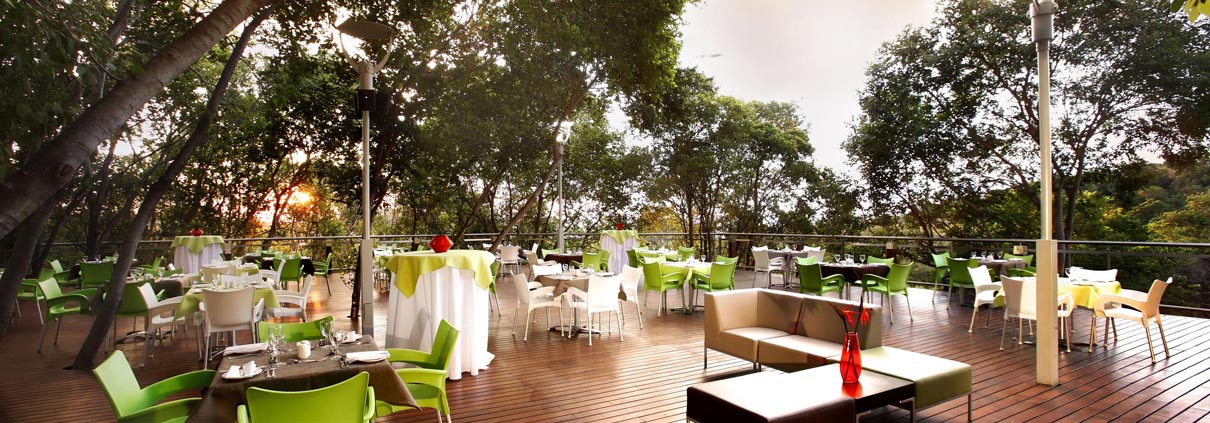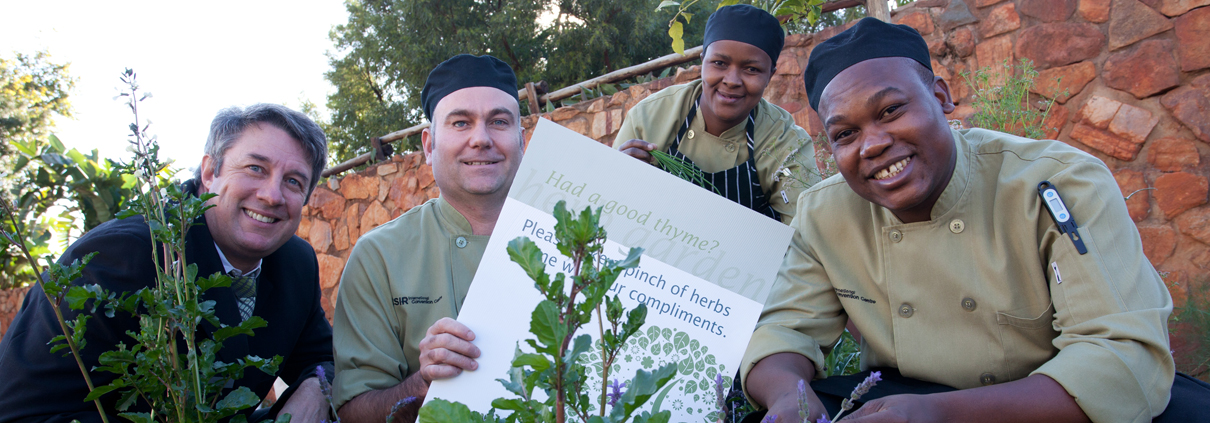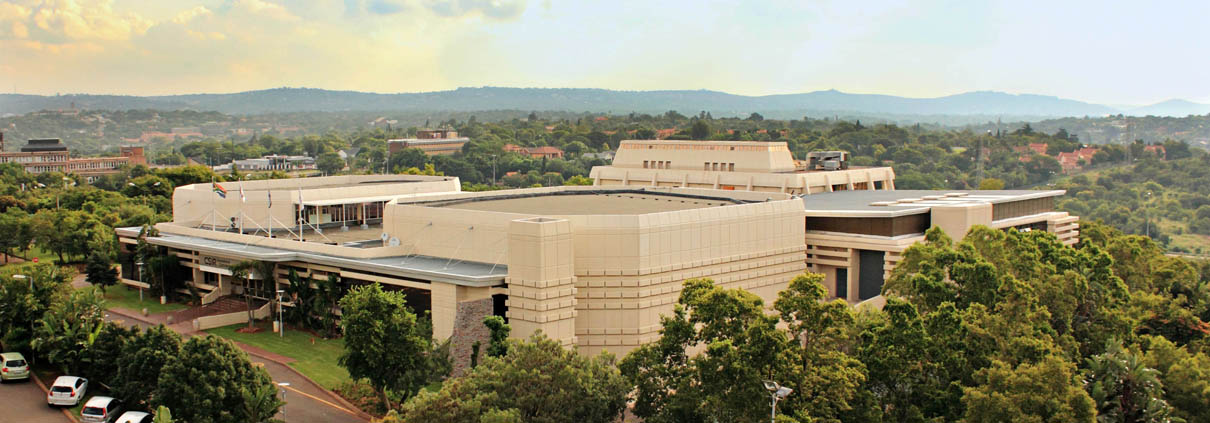CSIR ICC – Taking care of our environment
The CSIR International Convention Centre (CSIR ICC) has various ‘greening’ initiatives and is flexible and supportive in dealing with clients’ requests in terms of ensuring their conferences and events’ negative impact on the environment is as minimal as possible. The CSIR ICC is proactive in that various ‘greening’ initiatives have been implemented at the Centre over the years and the Centre has trained its staff and partnered with relevant service providers to proactively assist clients in ‘greening’ their events.
Waste Management and Recycling
- Separation of waste (bottle, paper, plastic, glass, food, etc) at source for recycling. A twin-bin system is placed in all public venues and kitchens have a multi-bin system as these are areas in which the largest variety of waste is produced. Waste is kept separate in special larger bins in the outdoor waste collection area until collected by an accredited provider for recycling.
- The Convention Centre has printers that use recyclable cartridges. Used cartridges are collected for recycling.
- A lot of equipment in the Centre makes use of batteries which have a negative impact on the environment if not disposed properly. The Centre ensures that battery usage is kept to a minimum without compromising on clients’ service. Used batteries are stored until collected by an accredited provider of battery recycling services.
- To save on paper usage the CSIR ICC has introduced an Covid-19 online screening questionnaire.
- Water coolers containing filtered water have been discontinued during the Covid-19 period.
- Since the inception of Covid-19 regulations, the CSIR ICC has opted to provide meal services in fully compostable packaging and eat-ware not only general biodegradable material. While compostable products are biodegradable, they have an added benefit – break down, they release valuable nutrients into the soil, aiding the growth of trees and plants.
- The CSIR ICC sells its used cooking oil to a company that reuses the oil to make putty oil, polish or soap and biodiesel. This is one of the safest way of disposing used cooking oil.
- Wherever possible the CSIR ICC prints all necessary print material on recycled paper or paper from a sustainable source. Where electronic material can be used printing is eliminated and replaced by electronic material.
Energy Demand Management
- Building Management System (BMS)
The CSIR ICC has a BMS system to control the use of heating, ventilation and cooling (HVAC) in the building. The BMS is scheduled to instruct the HVAC systems to only operate when venues are in use, this is in order to minimise the usage of energy. Various combinations of control are used to manage electricity demand down i.e. in cooler months the HVAC system is scheduled to warm venues that are to be used on any given day between 3am and 6am, the system then switches off mid morning which is the time when boilers and ovens are in use in the kitchens. This significantly reduces electricity demand. The newly built management offices have no air conditioning system allowing natural air flow to warm and cool the area thereby saving energy. - Lighting
All light bulbs used and luminaries fitted in the CSIR ICC are energy saving and energy efficient. Some new areas of the expanded building have motion sensors to switch the light on when in use and off when not.
Carbon footprint management
The Convention Centre hosts large events and always encourages attendees to make use of a shuttle service. The provided shuttle service helps to reduce carbon footprint.
Economic and social responsibility
The Convention Centre has been recognised by the City of Tshwane for its contribution in the city’s economic development.
- Since 2001, the CSIR International Convention Centre (ICC) has been contributing to capacity development in South Africa by annually taking on in-service trainees from Tshwane University of Technology studying towards their Food and Beverage and Hospitality Management diplomas or other industry related qualifications. A number of the students have been hired by the Centre on completion of their courses. To date more than twenty students have completed their 6 months of experiential training at the Convention Centre. The Centre believes giving previously disadvantaged students a platform to gain first-hand experience and exposure to the corporate industry.
- Donation of idle assets and equipment to charities.
- Donation of excess food to charities.
Gauteng Green Events Guidelines
Resource depletion, environmental degradation, carbon emissions, global warming, filling up of landfill sites, social responsibility – these are all current issues of concern. As a result, there is an international movement across all industries to reduce their various impacts on the environment by promoting resource efficiency and sustainability. This includes the events industry.
Thousands of events, meetings and conferences are being held annually with a large demand on natural resources. In recognition of this demand and our responsibility as an industry, the Gauteng tourism authority (GTA) has developed Green Events Guidelines with the aim to promote resource efficiency and sustainability within the events industry in Gauteng.
This book can be used as a guideline for implementing a green programme for a range of events, such as meetings, festivals, conferences and exhibitions. It applies equally to large sports events and small local community initiatives.
The handbook is not only intended for professional event organisers, but also for people arranging small informal events at schools or in their local community.
To understand the full process and the reason for event greening it is recommended that the guidelines be read in its entirety. There is some duplication of information between the different sections to provide a comprehensive overview and to ensure continuation of information in the different sections. The reality is that it can’t and should not be seen in isolation, but is integrated throughout all the aspects of an event.
Download the Gauteng Green Events Guidelines
CSIR ICC commits to Net Zero Carbon Events pledge
The Council for Scientific and Industrial Research International Convention Centre (CSIR ICC) has signed up to participate in the Net Zero Carbon Events initiative that was established at the Conference of the Parties 26 UN Climate Change Conference. The initiative is acknowledgement that there is an urgent need to accelerate the transition towards global net zero emissions, and for the events industry to play its part in helping to deliver the goals of the Paris Agreement and ensuring a just transition.
Over the years, the CSIR ICC has implemented several social and environmental responsibility initiatives and has trained staff and partnered with relevant service providers to proactively promote green conferences to clients who share its commitment towards the environment by reducing the environmental impact of their events hosted at the ICC. Below are some of the initiatives that are already in place at the CSIR ICC.
Waste management and recycling
The separation of waste (bottles, cans, glass, paper, etc.) at source inside the CSIR ICC increases the centre’s awareness of the vast amount of waste that it throws away. There is a twin-bin system in all public venues and kitchens. Waste is kept separate in special larger bins in the outdoor waste collection area until it is collected by an accredited provider for recycling. The ICC also contributes to used cooking oil recycling initiatives. The oil is collected by a professional oil-recycling company and is used in an environmentally friendly and responsible way and according to the regulations relating to Edible Fats and Oils (Government Notice12 No. R 1316 of 16 August 1996). None of the oil that is recycled is used for human consumption.
Energy demand management
The CSIR ICC has a building management system (BMS) system to control the use of heating, ventilation, and cooling (HVAC) in the building. The BMS is scheduled to instruct the HVAC systems to only operate when venues are in use to minimise the use of energy. For example, in cooler months, the HVAC system is scheduled to warm up venues that are to be used on any given day between 03:00 and 06:00, the system then switches off mid-morning, which is when boilers and ovens are in use in the kitchens. This intelligent scheduling results in tremendous electricity savings, contributing toward the ICC’s net zero goals.
Economic and social responsibility
The CSIR ICC has been contributing to capacity pipeline development by annually appointing in-service trainees who are studying towards food and beverage and hospitality management diplomas or other industry-related qualifications. Several students who have completed their in-service training with the CSIR ICC have been hired in permanent positions by the centre on completion of their courses. Out-dated furniture, equipment and excess conference stationery are regularly donated to charities, which make use of these in classrooms and care facilities in need. Surplus food from the CSIR ICC kitchens is also donated to a variety of charities in the City of Tshwane.
By signing up for the Net Zero Carbon Events initiative, the CSIR ICC pledges to:
- Publish the organisation’s pathway to achieve net zero by 2050 at the latest, with an interim target, in line with the Paris Agreement’s requirement, to reduce global greenhouse gas emissions by 50% by 2030;
- Collaborate with partners, suppliers and customers to drive change across the value chain;
- Measure and track Scope 1, 2, and 3 greenhouse gas emissions according to industry best practice; and
- Report on progress at least every two years.
As one of the leading conference venues in the country, the CSIR ICC understands its responsibility to contribute to the protection of the environment through its commitment to proactively promote resource efficiency and sustainability in its operations for the benefit the communities in which it operates.
For more information about the Net Zero Carbon Events Initiative read here: Net Zero Carbon Events | Net Zero Carbon Events



